EU, UK Slap Fresh Sanctions On Iran For Violent Crackdown On Protests
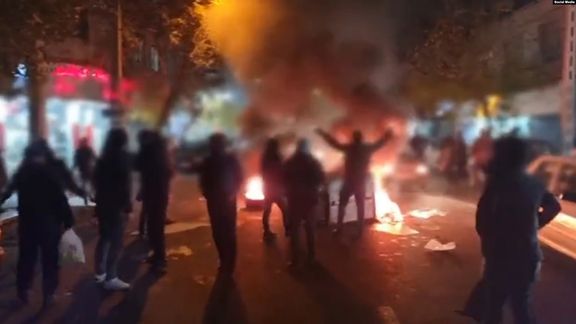
The European Union has slapped new sanctions on Iranian officials and entities for their role in the violent crackdown on the ongoing protests.

The European Union has slapped new sanctions on Iranian officials and entities for their role in the violent crackdown on the ongoing protests.
In a statement on Monday, the body also spelled out that those responsible for the killing of Mahsa Amini must be held accountable.
The EU called on the Iranian authorities to ensure “transparent” and “credible investigations” to clarify the number of deaths and arrests, to release all non-violent protestors and to provide due process to all detainees.
In addition, the declaration stressed that Tehran’s decision to restrict internet and block messaging platforms “violates the freedom of expression”.
The European Union imposed asset freezes and visa bans on 32 Iranian individuals and two entities including Iran's education and culture ministers in the latest round of sanctions against Tehran over its crackdown on demonstrators.
In total, EU sanctions now apply to 196 individuals and 33 entities in Iran.
Meanwhile, the British Foreign Secretary said the UK had "sanctioned several regime members involved in repressing and killing the Iranian people, including children."
The list of sanctioned individuals includes IRGC members, such as the commander of provinces in which security forces have severely injured and killed children. Three senior judges have also been sanctioned for imposing death penalties on protestors.
Since Mahsa Amini’s death in September 2022, the UK has imposed sanctions on more than 50 Iranian individuals and entities in response to human rights violations by the regime.
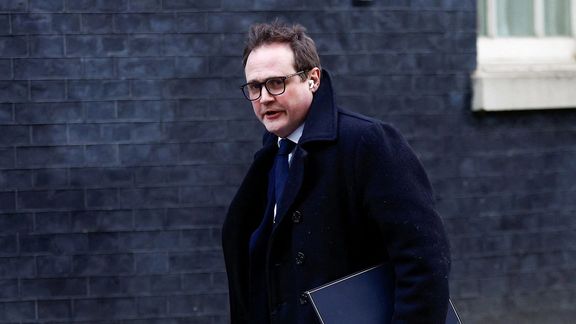
UK’s Security Minister Tom Tugendhat at the British Parliament Monday voiced full support for Iran International TV that had to relocate its broadcasting due to Tehran’s threats.
“The Home Secretary and I absolutely condemn this outrageous violation of our sovereignty, and the attempted violation of the human rights of those journalists,” he said, after the British government determined credible threats to the Persian news network emanating from the government of Iran.
The network announced on Saturday that it decided to move its studio and broadcast operations to its office in Washington DC after more than three months of threats the British police reported against its journalists.
Tugendhat told parliament that “In response, we have put in place an extremely robust range of security measures, including armed policing.” A suspect was arrested February 11 in the vicinity of Iran International’s headquarters in London. He was later arraigned at court on suspicion of terror-related activities.
He explained that despite the security measures put in place and considering the “severity of the threat and the particularities of this site, Counter Terrorism Policing have advised Iran International to move to a more secure location in the United Kingdom.” Until then, he added, the network has “chosen to continue their broadcasting from existing studios in the United States. I can assure the House that this measure will be temporary.”
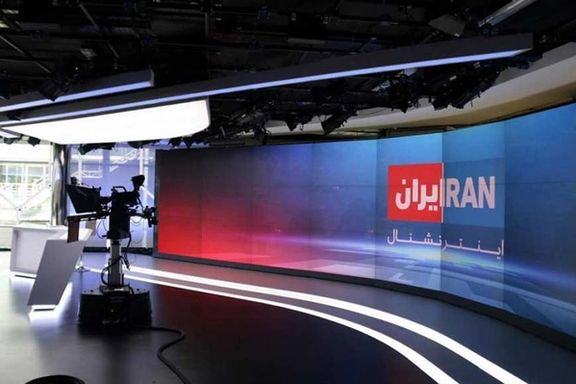
Tugendhat also announced that UK officials are looking to find a temporary location for the UK operations until a permanent and secure headquarters can start operations for the network.
During the session, Labour MP Holly Lynch said: We should be appalled that Iran International felt the need to close its office after a series of threats made against their brave journalists…IRGC is so free to establish support in UK. We have to stop it. Why are Supreme Leader’s [Ali Khamenei] representatives still here.” Lynch was referring to the Islamic Centre of England and an individual carrying the title of Khamenei’s representative.
The security minister in his speech mentioned this issue and said the government is looking into it, since the outfit is apparently registered as a charity.
Tugendhat said, “Tehran’s efforts to silence Iran International are a direct attack on our freedoms and an attempt to undermine our sovereignty.
They will fail.
Democracy is as much about journalists and civic activists as it is about politicians.”
He pledged that the government will take further action in response to to these threats and said that it has set up the Defending Democracy Taskforce.
“The Government, police, agencies, and our allies are working together to ensure Iran International’s UK operations will resume. These threats will not silence us – nor them,” he insisted.
The security minister told the parliament that Iran’s clandestine operations in the United Kingdom are not new. “Between 2020 and 2022, Iran tried to collect intelligence on UK-based Israeli and Jewish individuals. We believe this information was a preparation for future lethal operations.”
As the session was taking place, the government announced that it summoned Iran's most senior diplomat in London to protest at what were serious threats against journalists living in Britain.
"I am appalled by the Iranian regime’s continuing threats to the lives of UK-based journalists and have today summoned its representative to make clear this will not be tolerated," Foreign Secretary James Cleverly said in a statement.
Citing the great cultural and literary heritage of Iran, Tugendhat said that today “the tyrants in Tehran have betrayed those great pillars of Persian civilization and are trying to silence those words and their own people.”
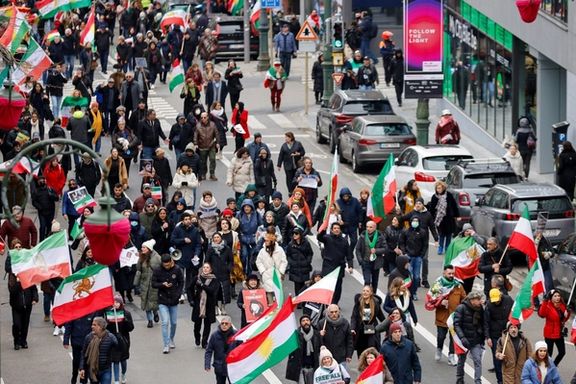
An estimated crowd of more than 20,000 held a rally in Brussels to call on EU countries to designate Iran’s Revolutionary Guard as a terrorist organization.
A diverse group of figures delivered speeches in the Belgian capital condemning the Islamic Republic and its multifunctional armed force, the IRGC, expressing solidarity with the dissidents in Iran who have been out on streets since September protesting for the fall of the clerical regime.
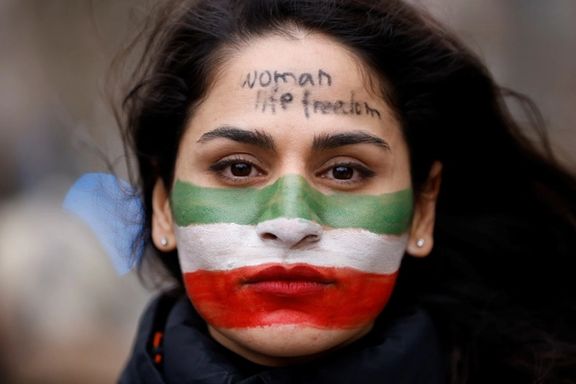
Alireza Akhondi and Darya Safai, two representatives of Iranian origin in the parliaments of Sweden and Belgium were among the original organizers of the rally, meant to push the EU for the inclusion of the IRGC in the list of terrorist organizations in the European Union.
During the demonstration – accompanied by musical and theatrical performances, women’s rights activist Masih Alinejad called for unity among Iranian opposition figures, a demand which has been echoed repeatedly by prominent activists since a historic forum in Washington earlier this month by eight prominent dissident activists heralded a united front.
Alinejad said, "The secret of our victory is our unity. We are scarred by the same regime for years... We will not win if we do not hold each other's hands."
Canada-based activist leader Hamed Esmaeilion, whose daughter and wife were killed by the IRGC in the shooting down of a Ukrainian airliner in 2020, said that the Revolutionary Guard was established to defend the Islamic Revolution and not the Iranian people. "There is still no mention of Iran in the name of this institution," he noted. "After the war with Iraq, the Revolutionary Guard became an economic and security monster, and today it is the most important instrument to suppress the people of Iran," he added.
"In future Iran, there'll be no IRGC. Army will protect the country's territorial integrity. Military won't interfere in politics. And the economy will be controlled by experts instead of eulogists in uniform," he said.
Former US President George W. Bush, NATO Secretary General Jens Stoltenberg, Iranian Nobel Peace Prize Laureate Shirin Ebadi, member of the Chamber of Representatives of Belgium Theo Francken, Former Assistant to the US President for National Security Affairs John Bolton, Executive Director of United Nations Watch Hillel Neuer, Member of the European Parliament Abir Al-Sahlan, and member of the Hamburg city parliament Danial Ilkhanipour delivered speeches or sent messages for the Brussels rally.
Concurrent with the gathering in the Belgian capital, another rally was held in the German city of Dusseldorf.
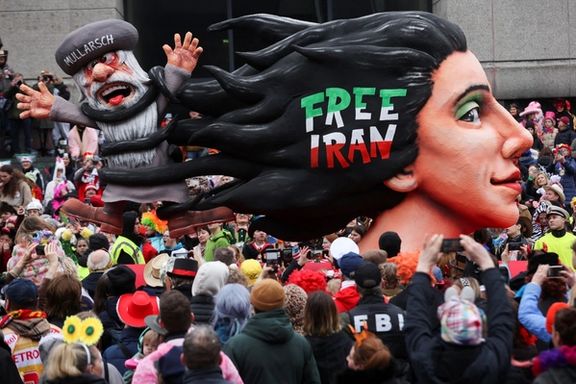
Also on Monday, the EU sanctioned 32 Islamic Republic officials, including culture and education ministers, deputy IRGC commander, and several MPs. The move can be seen as a measure to justify the fact that the EU is not yet ready to designate the entirety of the IRGC.
European Commission President Ursula von der Leyen said last week that the EU would propose sanctions targeting for the first time Iranian economic operators involved in the Russian war in Ukraine. "For the first time we are also proposing to sanction Iranian entities including those linked to Iran's Revolutionary Guard," she said.
In January, the block's foreign policy chief Josep Borrell said that the European Union cannot list the IRGC as a terrorist entity until an EU court has determined that they are, noting "Ministers adopted a new package of sanctions against Iran, targeting those driving the repression. The EU strongly condemns the brutal and disproportionate use of force by the Iranian authorities against peaceful protesters," he said but no action was taken to designate the IRGC.
There have been numerous Iranian terror acts in Europe, where courts have indicted top officials. In addition, IRGC’s record in organizing attacks elsewhere are well-documented. Critics say that Borrell is focused on re-starting nuclear talks with Iran after the previous long round of negotiations in 2021-2022 ended last September without success.
The European Parliament has called on the EU to list the Revolutionary Guards as a terrorist entity, blaming it for the repression of domestic protests and the supply of drones to Russia.
Moreover, EU legal experts have declared that the bloc does not currently have legal grounds to list Iran's Revolutionary Guards as a terrorist organization, German Foreign Minister Annalena Baerbock said on Monday.
"As of now, we don't have legal grounds in the EU to list the Revolutionary Guards as a terrorist organization," Baerbock told reporters at the end of a meeting of EU foreign ministers in Brussels.
The United States has said it is not pursuing the revival of the 2015 nuclear deal, or the JCPOA, and instead its attention is on the popular movement in Iran and on Tehran’s supply of kamikaze drones to Russia.
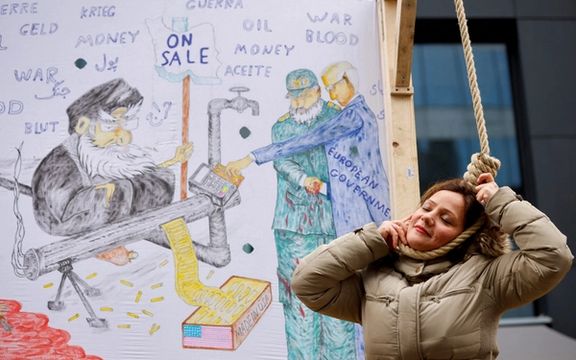
The IRGC was set up shortly after the 1979 Islamic Revolution to protect the Shi’ite clerical ruling system and provide a counterweight to the regular armed forces.
It has an estimated 125,000-strong military with army, navy and air units. It also commands the Basij religious militia, a volunteer paramilitary force loyal to the clerical establishment which is often used to crack down on anti-government protests.
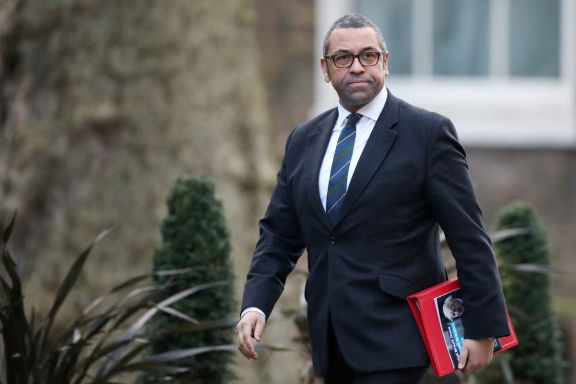
The British government summoned Iran's most senior diplomat in London on Monday to protest at what it said were serious threats against journalists living in Britain.
On Saturday, Iran International TV, a London-based television station, announced it was moving its live broadcasting studios to the United States following threats it faced in Britain.
"I am appalled by the Iranian regime’s continuing threats to the lives of UK-based journalists and have today summoned its representative to make clear this will not be tolerated," Foreign Secretary James Cleverly said in a statement.
The ministry said the Iranian Charge d’Affaires had been told in a meeting with British officials that Britain would not accept such threats to life and media freedom.
Threats linked to the Islamic Republic against the network’s journalists first surfaced in November, when the Metropolitan Police warned the management of direct dangers to some individuals.
Earlier, the head of Counter Terrorism Policing (CTP), Assistant Commissioner Matt Jukes in London had confirmed that they will continue to work closely with intelligence partners and others to investigate potential threats projected from Iran against a number of UK-based individuals, support those affected and put in place measures to keep them safe, including protective security measures such as an overt armed policing presence focused around the west London offices of the Persian-language media company.
Separately, the government-imposed sanctions on three Iranian judges, three members of Iran's Islamic Revolutionary Guard Corps and two regional governors over what it said were human rights violations.
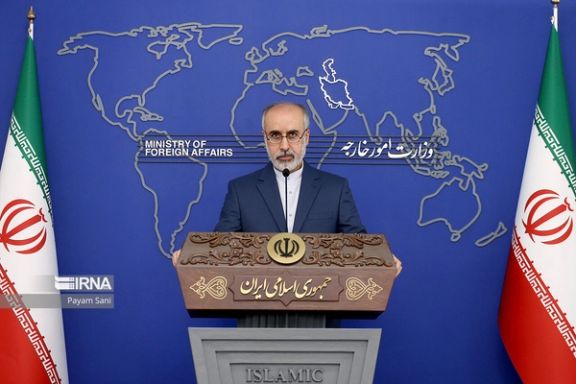
Iran's foreign ministry briefing on Monday was marked by a barrage of irate remarks about opposition figures having been invited to the Munich Security Conference.
Foreign Ministry spokesman Nasser Kanaani said during his weekly briefing that the organizers of the 2023 Munich Security Conference promoted war instead of security by inviting prominent dissident figures instead of the regime officials, who were usually present at the prestigious event.
Calling the move “a grave mistake” that “damaged the conference’s credibility,” he said they sought unilateralism in the international order by preventing the expression of different views. “We believe that this year, the conference was organized in the name of security, but for the sake of war and warmongers,” he added.
“The conference was held in the name of security, but it did not invite important countries such as the Islamic Republic [of Iran] and Russia. It means that the conference has given the opportunity, which could be used to raise different multilateral views regarding international order and security, to parties and currents that sought to consolidate unilateralism in the international arena.”
While the Iranian regime has become increasingly isolated, Kanaani claimed that “The Islamic Republic is one of the most important countries with an undisputed role in deepening and consolidating regional security, and it is among effective countries that helps reinforce international security.”
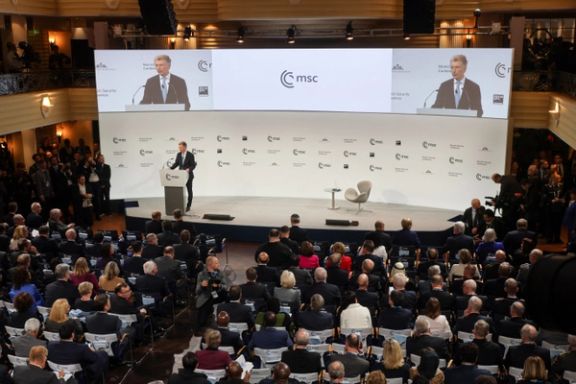
Western countries have strongly rebuked Tehran for its bloody crackdown over protests, its military support for Russia’s invasion of Ukraine and lack of compromise over its highly disputed nuclear program.
As Kanaani was speaking to reporters in Tehran, a large number of Iranians gathered outside the European parliament in the Belgian capital Brussels to call on the European Union countries to designate the Revolutionary Guard (IRGC) as a terrorist organization.
Thousands of Iranians from all over Europe held a massive rally in Strasbourg in January for the same purpose.
After a historic forum in Washington earlier this month by eight prominent dissident activists, they have been traveling to events around the world to make the voice of the Iranian opposition heard. Such events signal the emergence of a leadership council in the diaspora to campaign for international support in favor of Iran’s protest movement.
Elsewhere in his remarks, Kanaani said Tehran is committed to technical cooperation with the International Atomic Energy Agency (IAEA), noting that “The Islamic Republic’s technical cooperation with the IAEA is an important principle for our country. In turn, we expect the agency to behave professionally toward Iran’s peaceful nuclear activities and adhere to the principles and frameworks of professional and specialized cooperation with member states, including the Islamic Republic."
He was referring to a report on Sunday in which Bloomberg News quoted senior diplomats as saying that the UN watchdog, the IAEA had recently detected uranium enriched to 84 percent while monitoring Iran’s nuclear facilities. Iran has been enriching uranium to up to 60 percent purity since April 2021. Three months ago, it started enriching to that level at a second site, Fordow, which is dug into a mountain. Weapons grade is around 90%.
“Raising such issues through the media, while they should normally be discussed in technical and specialized contacts and in bilateral meetings, shows that the agency is distancing from its professional behavior and specialized position,” Kanaani said.
The spokesman for the Atomic Energy Organization of Iran (AEOI) Behrouz Kamalvandi has rejected the report, saying the country’s nuclear facilities have never enriched uranium above 60 percent.
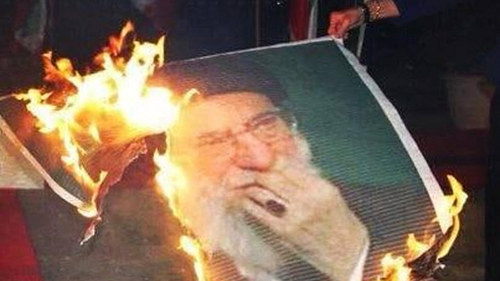
Iranians once again held anti-regime protests and engaged in acts of defiance in Tehran and other cities on Sunday.
Several neighborhoods of capital Tehran once again witnessed overnight anti-government slogans by protesters.
People in Jannat Abad west of Tehran chanted slogans like “Death to the Dictator” and “Freedom, Freedom, Freedom” from inside their houses and residential complexes.
Baqeri town in the west of the capital, which is home to many IRGC staff, was also the scene of anti-government slogans. "Death to Khamenei", "Death to the IRGC" were among the nightly slogans of the protesters in this town.
Protesters in Ekbatan, west of Tehran, also chanted "Death to the dictator" and "Death to Khamenei". This comes as security forces set up checkpoints at the entrances of Ekbatan Sunday evening.
Despite the extensive arrests of residents Ekbatan has been one of the main hubs of protests in the capital since the beginning of unrest against the Islamic Republic after the death in custody of Mahsa Amini in September.
In Narmak neighborhood in the east, people chanted "Death to the dictator", "Death to the child-killing regime" and "Death to Khamenei, damn Khomeini".
In the cities of Rasht in the north and Bandar Abbas in the south, the protesters also wrote slogans on the walls, and in Yasouj in the southwest, they set fire to regime placards, including a large banner showing the image of Supreme Leader Ali Khamenei.